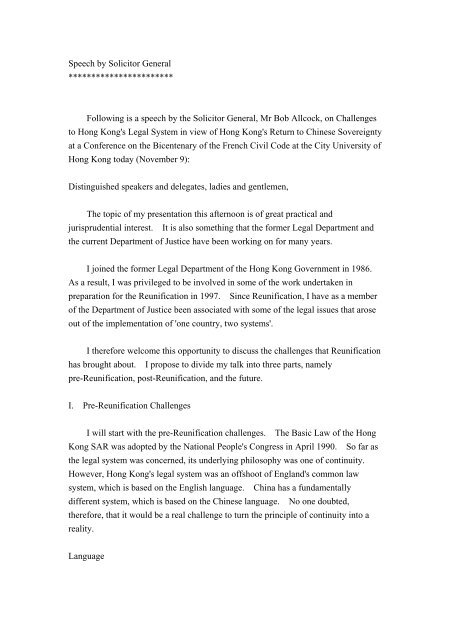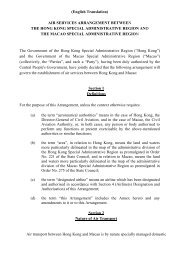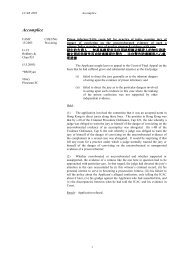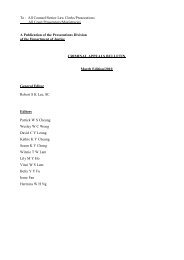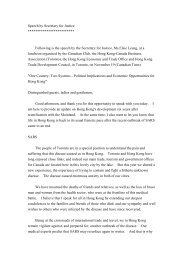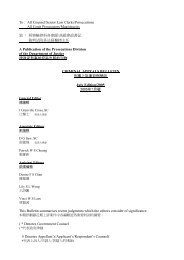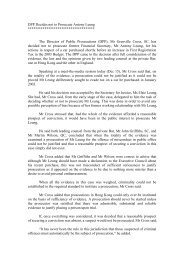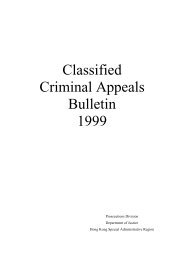Speech by Solicitor General - Department of Justice
Speech by Solicitor General - Department of Justice
Speech by Solicitor General - Department of Justice
You also want an ePaper? Increase the reach of your titles
YUMPU automatically turns print PDFs into web optimized ePapers that Google loves.
<strong>Speech</strong> <strong>by</strong> <strong>Solicitor</strong> <strong>General</strong><br />
***********************<br />
Following is a speech <strong>by</strong> the <strong>Solicitor</strong> <strong>General</strong>, Mr Bob Allcock, on Challenges<br />
to Hong Kong's Legal System in view <strong>of</strong> Hong Kong's Return to Chinese Sovereignty<br />
at a Conference on the Bicentenary <strong>of</strong> the French Civil Code at the City University <strong>of</strong><br />
Hong Kong today (November 9):<br />
Distinguished speakers and delegates, ladies and gentlemen,<br />
The topic <strong>of</strong> my presentation this afternoon is <strong>of</strong> great practical and<br />
jurisprudential interest. It is also something that the former Legal <strong>Department</strong> and<br />
the current <strong>Department</strong> <strong>of</strong> <strong>Justice</strong> have been working on for many years.<br />
I joined the former Legal <strong>Department</strong> <strong>of</strong> the Hong Kong Government in 1986.<br />
As a result, I was privileged to be involved in some <strong>of</strong> the work undertaken in<br />
preparation for the Reunification in 1997. Since Reunification, I have as a member<br />
<strong>of</strong> the <strong>Department</strong> <strong>of</strong> <strong>Justice</strong> been associated with some <strong>of</strong> the legal issues that arose<br />
out <strong>of</strong> the implementation <strong>of</strong> 'one country, two systems'.<br />
I therefore welcome this opportunity to discuss the challenges that Reunification<br />
has brought about. I propose to divide my talk into three parts, namely<br />
pre-Reunification, post-Reunification, and the future.<br />
I. Pre-Reunification Challenges<br />
I will start with the pre-Reunification challenges. The Basic Law <strong>of</strong> the Hong<br />
Kong SAR was adopted <strong>by</strong> the National People's Congress in April 1990. So far as<br />
the legal system was concerned, its underlying philosophy was one <strong>of</strong> continuity.<br />
However, Hong Kong's legal system was an <strong>of</strong>fshoot <strong>of</strong> England's common law<br />
system, which is based on the English language. China has a fundamentally<br />
different system, which is based on the Chinese language. No one doubted,<br />
therefore, that it would be a real challenge to turn the principle <strong>of</strong> continuity into a<br />
reality.<br />
Language
When the Sino-British Joint Declaration was signed in 1984, all <strong>of</strong> Hong Kong's<br />
hundreds <strong>of</strong> Ordinances were expressed only in the English language. The Basic<br />
Law allows English to be continued to be used in the law, in addition to Chinese. It<br />
does not, however, envisage that English alone may be used. It was therefore<br />
decided that, before Reunification, all our laws should be bilingual, and all <strong>of</strong> our<br />
courts should be able to operate in either English or Chinese.<br />
The process <strong>of</strong> producing an authentic Chinese text for hundreds <strong>of</strong> Ordinances<br />
was indeed challenging. Given the many obscure English terms used in the law,<br />
many new Chinese expressions had to be invented. Nonetheless, the herculean task,<br />
which lasted about ten years, was finished shortly before Reunification. In addition,<br />
starting from 1989 all new legislation has been produced in bilingual form.<br />
Legislation was also passed enabling all courts to operate in either English or<br />
Chinese, at the choice <strong>of</strong> the court itself. Even where English is used, translation to<br />
and from Chinese is <strong>of</strong> course available where a party or witness needs it.<br />
Continuity <strong>of</strong> laws<br />
What about the continuity <strong>of</strong> the law itself? Article 160 <strong>of</strong> the Basic Law<br />
provides that, upon the establishment <strong>of</strong> the Hong Kong SAR, the laws previously in<br />
force in Hong Kong shall be adopted as laws <strong>of</strong> the Region, except for those which<br />
the Standing Committee <strong>of</strong> the National People's Congress declares to be in<br />
contravention <strong>of</strong> the Basic Law.<br />
This provision looked reassuring. However, the principle <strong>of</strong> continuity was at<br />
risk in two ways. Firstly, the definition <strong>of</strong> "laws previously in force" did not include<br />
UK legislation that applied to Hong Kong. Hong Kong's law in many important<br />
areas was found in such legislation. For example, its laws relating to civil aviation,<br />
merchant shipping and copyright were all UK laws.<br />
The challenge was to ensure the continued application <strong>of</strong> those laws <strong>by</strong><br />
re-enacting them as Hong Kong legislation before Reunification. That challenge<br />
was taken up, and completed before 1 July 1997. As a result, there was no gap<br />
resulting from the disapplication <strong>of</strong> UK laws.<br />
What about the power <strong>of</strong> the Standing Committee <strong>of</strong> the National People's<br />
Congress to declare that some Hong Kong laws contravened the Basic Law? In
February 1997, the Standing Committee determined that 24 Ordinances (in whole or<br />
in part) contravened the Basic Law. Most <strong>of</strong> those 24 Ordinances were, in fact,<br />
colonial relics that would not be missed. However, amongst those laws were the<br />
Ordinance relating to the election <strong>of</strong> members <strong>of</strong> the Legislative Council, and parts <strong>of</strong><br />
the Public Order Ordinance and Societies Ordinance. Their non-adoption would<br />
create important gaps in our law that would need to be filled. Those gaps were,<br />
however, filled <strong>by</strong> new legislation that was enacted immediately, or shortly, after<br />
Reunification. The new SAR therefore started life with a complete set <strong>of</strong> domestic<br />
laws.<br />
Application <strong>of</strong> Mainland laws<br />
Before leaving the question <strong>of</strong> the maintenance <strong>of</strong> Hong Kong's laws, I should<br />
point out that Article 18 <strong>of</strong> the Basic Law provides that national laws shall not be<br />
applied in the Hong Kong SAR except for those listed in Annex III to the Basic Law.<br />
That Annex contains a short list <strong>of</strong> national laws in areas such as nationality,<br />
diplomatic privileges and immunities, the territorial sea, and the national flag.<br />
Those laws would not have a major impact on our legal system. Hong Kong's legal<br />
system would, for most purposes, be entirely distinct from that in the Mainland.<br />
The courts<br />
I turn now to the courts. When the Basic Law was promulgated in 1990, the final<br />
avenue <strong>of</strong> appeal for cases heard in Hong Kong was the Privy Council in London.<br />
That position clearly could not survive Reunification. The Basic Law provided that<br />
a Court <strong>of</strong> Final Appeal should be established in Hong Kong, and that judges from<br />
other common law jurisdictions may as required be invited to sit on that court.<br />
The challenge, which proved to be a difficult one, was to establish a Court <strong>of</strong><br />
Final Appeal in Hong Kong that would be ready to operate on 1 July 1997 at the latest,<br />
and possibly earlier.<br />
There were two serious difficulties. The first was the composition <strong>of</strong> the court.<br />
As I have just said, the Basic Law provides that the Court <strong>of</strong> Final Appeal may invite<br />
judges (in the plural) from other common law jurisdictions to sit on it. The question<br />
was how was this provision to be implemented? In September 1991, the<br />
Sino-British Joint Liaison Group decided that, for each hearing, the court should<br />
consist <strong>of</strong> the Chief <strong>Justice</strong>, three permanent judges, and a fifth judge who could
either be a judge from another common law jurisdiction or a retired Hong Kong<br />
judge.<br />
This formula, which became known as the "4+1" formula, was highly<br />
controversial. Opponents argued that it breached the Basic Law, since the Basic<br />
Law says that the court may invite overseas "judges" (in the plural) to sit on it.<br />
Those defending the formula said that it would allow overseas judges (in the plural) to<br />
be invited, but only one at a time. In December 1991, the Legislative Council<br />
passed a motion rejecting the formula. This meant that legislation to establish the<br />
court on the basis <strong>of</strong> the 4+1 formula then stood no chance <strong>of</strong> being passed.<br />
The second difficulty was that the Chinese side <strong>of</strong> the Joint Liaison Group did<br />
not want the Court <strong>of</strong> Final Appeal established before Reunification. The British<br />
side, on the other hand, wanted the court established as soon as possible, so that it<br />
could gain experience and credibility well before Reunification.<br />
For a few years, these two difficulties prevented any progress. Finally, in 1995,<br />
there was a breakthrough on the second issue. It was agreed that the legislation to<br />
establish the court could be passed before Reunification, but that it should only come<br />
into effect on 1 July 1997. A majority <strong>of</strong> the Legislative Council was then<br />
persuaded to adopt the 4+1 formula, and the legislation was enacted in August 1995.<br />
The remaining challenge was to ensure that local and overseas judges <strong>of</strong> the highest<br />
calibre would be appointed as judges <strong>of</strong> the Court <strong>of</strong> Final Appeal on 1 July 1997.<br />
International Rights and Obligations<br />
The last <strong>of</strong> the pre-Reunification challenges that I propose to discuss relates to<br />
international rights and obligations. No legal system operates in a vacuum. Each<br />
jurisdiction is part <strong>of</strong> a complex web <strong>of</strong> multilateral and bilateral treaties. Before<br />
Reunification, over 200 multilateral agreements, and a large network <strong>of</strong> bilateral<br />
agreements, had been extended to Hong Kong <strong>by</strong> the United Kingdom. If nothing<br />
were done, Hong Kong would lose the benefit <strong>of</strong> all these agreements when British<br />
administration <strong>of</strong> Hong Kong ceased on Reunification.<br />
The multilaterals were <strong>of</strong> particular importance to Hong Kong's status as an<br />
international trade and financial centre. A sub-group <strong>of</strong> the Sino-British Joint<br />
Liaison Group worked on the idea that China should take over those multilaterals in<br />
respect <strong>of</strong> Hong Kong, and on the mechanism for doing so. Fortunately, that work
succeeded and, as a result, Hong Kong continues to participate in many international<br />
organizations, such as the WTO, the Customs Co-operation Council, and the<br />
International Maritime Organization.<br />
The position in respect <strong>of</strong> bilaterals was different. It was not possible for<br />
bilateral agreements entered into <strong>by</strong> Britain to be transferred to China. It therefore<br />
became apparent that the network <strong>of</strong> agreements in such areas as extradition, air<br />
services, and mutual legal assistance would all fall away on Reunification. The<br />
challenge was to replace them with new ones as soon as possible.<br />
The Joint Liaison Group again proved to be the key to this process. Under an<br />
agreement reached in the JLG, Hong Kong was authorised to sign new bilateral<br />
agreements in the areas I have mentioned, and those agreements would be recognized<br />
after 1997. As a result <strong>of</strong> that agreement, negotiations for new bilaterals began and,<br />
<strong>by</strong> the time <strong>of</strong> Reunification, Hong Kong had concluded more than ten air services<br />
agreements, a handful <strong>of</strong> fugitive <strong>of</strong>fenders agreement and one mutual legal assistance<br />
agreement.<br />
II.<br />
Post-Reunification Challenges<br />
That covers the work done in preparation for Reunification.<br />
many challenges we have faced since Reunification.<br />
I now turn to the<br />
One could say, in general terms, that having to operate under a new constitution<br />
has been a challenge. Before Reunification the colonial constitutional instruments<br />
were brief and rather antiquated. In contrast, the Basic Law is a detailed, modern<br />
constitution that creates many justiciable rights that did not previously exist.<br />
I believe that Hong Kong's legal system, and the legal pr<strong>of</strong>ession, have in<br />
general adapted to this new order without great difficulty. There are, <strong>of</strong> course, a<br />
few areas <strong>of</strong> controversy, which I will describe later. But, as a general rule, I believe<br />
the Basic Law has been smoothly implemented.<br />
Filling the gaps<br />
At the working level, the challenges have arisen in a number <strong>of</strong> specific areas.<br />
The immediate task, on 1 July 1997, was to ensure that there were no gaps - that<br />
nothing fell between the cracks <strong>of</strong> the transition.
Appointments to the Judiciary made <strong>by</strong> the British administration all lapsed on<br />
30 June 1997. The Chief Executive therefore needed to make new appointments, in<br />
accordance with the recommendations <strong>of</strong> the Judicial Officers Recommendation<br />
Commission. That Commission recommended the re-appointment <strong>of</strong> all judges<br />
serving on 30 June 1997, and the Chief Executive duly re-appointed them on the<br />
morning <strong>of</strong> 1 July.<br />
So far as the new Court <strong>of</strong> Final Appeal was concerned, appointments were<br />
made not only <strong>of</strong> a Chief <strong>Justice</strong> and three permanent judges <strong>of</strong> the highest calibre,<br />
but also <strong>of</strong> a panel <strong>of</strong> overseas judges and retired Hong Kong judges that inspired the<br />
greatest confidence. The overseas judges included, for example, a retired Chief<br />
<strong>Justice</strong> <strong>of</strong> Australia, and a serving member <strong>of</strong> the Privy Council.<br />
As a result <strong>of</strong> all this, the courts were fully functioning on 2 July 1997.<br />
However, all the plans for the continuity <strong>of</strong> the legal system were called in question<br />
on that day. The lawyers defending a person who had been charged before<br />
Reunification with a common law <strong>of</strong>fence argued that the proceedings could not<br />
continue. They argued that the common law no longer applied in Hong Kong, and<br />
that proceedings originally brought in the name <strong>of</strong> Her Majesty the Queen could not<br />
be continued in the Hong Kong SAR.<br />
I need hardly tell you how sensational those arguments were at the time.<br />
Fortunately for the legal system, although not for the defendant, the court rejected the<br />
arguments. We all breathed a sigh <strong>of</strong> relief.<br />
Adaptation <strong>of</strong> laws<br />
Another step taken to ensure continuity was the enactment, in the early hours <strong>of</strong><br />
1 July 1997, <strong>of</strong> the Reunification Ordinance. This provided for continuity in various<br />
areas - such as existing legal proceedings, and the public service. It is also<br />
incorporated principles <strong>of</strong> statutory interpretation laid down <strong>by</strong> the Standing<br />
Committee <strong>of</strong> the National People's Congress in February 1997. Under those<br />
principles, terminology in laws previously in force that reflected the former British<br />
administration <strong>of</strong> Hong Kong is now interpreted in a way that reflects the new<br />
constitutional order. And so, for example, references to the Governor <strong>of</strong> Hong Kong<br />
are interpreted as references to the Chief Executive <strong>of</strong> the Hong Kong SAR.
Those principles have proved very useful. But it was nevertheless important<br />
that the old colonial terminology should be replaced <strong>by</strong> appropriate new terminology,<br />
through legislative amendments. The government therefore initiated what it calls the<br />
"adaptation <strong>of</strong> laws" exercise.<br />
That exercise has not been as easy as it might seem. Replacing 'the Governor'<br />
<strong>by</strong> 'the Chief Executive' may be simple. But there are not always such convenient<br />
substitutions. References to 'the Crown' have proved particularly difficult, since it is<br />
a concept peculiar to the British constitution. Nevertheless, a steady stream <strong>of</strong><br />
adaptation Bills were prepared and passed <strong>by</strong> the Legislative Council. The process<br />
is not yet complete - but about 93% <strong>of</strong> the Ordinances have been adapted.<br />
Bilingualism<br />
The challenge <strong>of</strong> creating a bilingual legal system is an ongoing process.<br />
Everyone agrees that the quality <strong>of</strong> the administration <strong>of</strong> justice must not be<br />
compromised <strong>by</strong> the greater use <strong>of</strong> Chinese. Nevertheless, the figures indicate that<br />
Chinese is being increasingly used in the courts, particularly at the lower levels. The<br />
latest figures on the use <strong>of</strong> Chinese in criminal cases are as follow -<br />
Magistracies - over 70%<br />
District Court - over 30%<br />
Court <strong>of</strong> First Instance - nearly 60% in magistracy appeals and over 20% in criminal<br />
trials<br />
Court <strong>of</strong> Appeal - over 20%<br />
NPCSC Interpretation<br />
The topics I have discussed so far may seem rather mundane. So let me turn to<br />
an issue that aroused passionate debate both in Hong Kong and elsewhere. Under<br />
Article 158 <strong>of</strong> the Basic Law, the ultimate power to interpret the Basic Law is vested<br />
in the Standing Committee <strong>of</strong> the National People's Congress. Hong Kong courts<br />
are authorised to interpret the Basic Law in adjudicating cases, although in certain<br />
cases they must seek an interpretation <strong>by</strong> the Standing Committee before deciding a<br />
case.<br />
The Standing Committee <strong>of</strong> the National People's Congress is a legislative, not a<br />
judicial, body. Lawyers trained in the common law tradition may be uncomfortable
with the idea <strong>of</strong> a legislative body interpreting the law. But this reflects the Chinese<br />
Constitution. All national laws in China are subject to interpretation <strong>by</strong> the Standing<br />
Committee. However, this type <strong>of</strong> interpretation does not occur as part <strong>of</strong> judicial<br />
proceedings. It is a type <strong>of</strong> clarification <strong>of</strong> the relevant legislation, and is therefore<br />
described as "legislative interpretation".<br />
Since Reunification, the Standing Committee has on two occasions interpreted<br />
provisions in the Basic Law. In 1999, Hong Kong's Chief Executive requested an<br />
interpretation <strong>by</strong> the Standing Committee <strong>of</strong> provisions relating to the right <strong>of</strong> abode<br />
in Hong Kong <strong>of</strong> Chinese citizens born in the Mainland. This followed a Court <strong>of</strong><br />
Final Appeal interpretation that was causing insurmountable problems for Hong Kong.<br />
It was estimated that the effect <strong>of</strong> the court's interpretation was that, within ten years,<br />
about 1.67 million people born in the Mainland would have the right to live in Hong<br />
Kong. That could have meant a 25% increase in Hong Kong's population.<br />
Faced with this massive immigration problem, and being unable to solve the<br />
problem in Hong Kong, the Chief Executive sought an interpretation <strong>by</strong> the Standing<br />
Committee. The Standing Committee confirmed that the provisions in the Basic<br />
Law were to be interpreted narrowly. The immigration problem was therefore<br />
solved.<br />
Some lawyers claimed that the request for the Standing Committee's<br />
interpretation was unconstitutional. However, the Court <strong>of</strong> Final Appeal itself<br />
rejected that claim, deciding in a subsequent case that the interpretation was valid and<br />
binding on Hong Kong courts.<br />
Nevertheless, the government recognised that the authority <strong>of</strong> Hong Kong's<br />
courts could be affected <strong>by</strong> a Standing Committee's interpretation, and made it clear<br />
that it would not lightly seek such an interpretation in future. The Chief Executive<br />
has not subsequently sought any further interpretation <strong>by</strong> the Standing Committee.<br />
The other interpretation <strong>of</strong> the Basic Law <strong>by</strong> the Standing Committee occurred in<br />
April <strong>of</strong> this year, and was not the result <strong>of</strong> any request from Hong Kong. It related<br />
to the provisions in the Basic Law concerning Hong Kong's democratic development.<br />
This time, there were few, if any, allegations that the interpretation was<br />
unconstitutional. Some did allege that it was contrary to Hong Kong's high degree<br />
<strong>of</strong> autonomy. However, it is clear that our high degree <strong>of</strong> autonomy does not<br />
preclude the Standing Committee's power <strong>of</strong> interpretation. As one American
constitutional law expert has said, it is not surprising that the Basic Law, which is a<br />
national law <strong>of</strong> China, should be subject to interpretation <strong>by</strong> a national body.<br />
Nevertheless, it must be accepted that the Standing Committee's power <strong>of</strong><br />
interpretation has caused concern about the integrity <strong>of</strong> our legal system. Some<br />
lawyers consider that the challenge ahead is to see if that power can be developed in a<br />
way that is more judicial in nature, and more open and transparent.<br />
Article 23 <strong>of</strong> the Basic Law<br />
Another cause <strong>of</strong> passionate debate has been Article 23 <strong>of</strong> the Basic Law.<br />
Since Hong Kong is part <strong>of</strong> China, there is a need for laws in Hong Kong that protect<br />
China's national security. Instead <strong>of</strong> applying the Mainland laws on this subject, the<br />
Basic Law provides that Hong Kong shall, on its own, enact relevant laws.<br />
Proposals for such laws were set out in a public consultation paper issued <strong>by</strong> the SAR<br />
Government in September 2002. The government emphasized that the new laws<br />
would need to comply with the human rights guarantees in the Basic Law. Indeed,<br />
an opinion was obtained from a London Queen's Counsel, who specialises in human<br />
rights, to the effect that the proposals were consistent with those rights.<br />
The public consultation exercise nevertheless revealed strong concerns about<br />
some <strong>of</strong> the proposals. As a result, the proposals were restricted in many ways<br />
before they were incorporated in the draft legislation. For example -<br />
* the <strong>of</strong>fence <strong>of</strong> treason was limited to times <strong>of</strong> war or the instigation <strong>of</strong> an armed<br />
invasion<br />
* an express provision was added, requiring the laws to be interpreted in accordance<br />
with the ICCPR<br />
* trial <strong>by</strong> jury was to be available for all <strong>of</strong>fences<br />
After being introduced into the Legislative Council, the Bill was scrutinised <strong>by</strong> a<br />
committee in meetings lasting over eighty hours. Over one hundred individuals or<br />
NGOs made representations to that committee. More than ninety papers relating to<br />
the Bill were prepared <strong>by</strong> the government for legislators.<br />
As a result <strong>of</strong> that process, the government agreed to further restrictions on the
provisions. However, despite assurances that the Bill would not undermine human<br />
rights, public concern grew. On 1 July 2003, more than half a million people took to<br />
the streets in protests against many things, including the proposed legislation.<br />
In the face <strong>of</strong> this concern, the government announced three further<br />
liberalisations. However, even those amendments were not sufficient to ensure the<br />
passage <strong>of</strong> the Bill. Eventually, in September last year, the Chief Executive<br />
announced that the Bill would be withdrawn.<br />
The challenge <strong>of</strong> enacting national security legislation has, so far, proved too<br />
difficult. Why is this? The approach to national security issues in the Mainland in<br />
the past has caused concern in Hong Kong. In addition, the text <strong>of</strong> the draft <strong>of</strong><br />
Article 23 was extended after the events in Tiananmen Square in June 1989. There<br />
was therefore a deep suspicion in Hong Kong that laws to implement Article 23<br />
would be draconian and would be aimed at suppressing dissent. That suspicion<br />
continued even when a Bill was produced that was, <strong>by</strong> any standards, liberal.<br />
The suspicion may have been fuelled <strong>by</strong> the process adopted. The<br />
government's attempt to complete the whole project - from consultation paper to<br />
enactment - in less than twelve months was ambitious. Its decision not to carry out a<br />
separate consultation exercise in respect <strong>of</strong> a draft Bill led to accusations <strong>of</strong><br />
high-handedness. And its refusal to extend the timetable because <strong>of</strong> the impact that<br />
SARS - Severe Acute Respiratory Syndrome - had on Hong Kong was regarded as<br />
insensitive.<br />
There is, as yet, no timetable for the resurrection <strong>of</strong> this project but the<br />
government has promised to learn from its experience. The implementation <strong>of</strong><br />
Article 23 will, however, be one <strong>of</strong> the greatest challenges in the implementation <strong>of</strong><br />
'one country, two systems'.<br />
New bilateral agreements<br />
Let me now return to more mundane challenges. I mentioned earlier that<br />
bilateral agreements applied to Hong Kong <strong>by</strong> the UK all fell away on Reunification,<br />
but that Hong Kong had been authorised to enter into new bilaterals.<br />
That process is an ongoing one - the challenge being to create an adequate<br />
network <strong>of</strong> agreements with jurisdictions we most need to deal with. In the absence
<strong>of</strong> this, Hong Kong could, for example, become a haven for fugitives from the law <strong>of</strong><br />
other jurisdictions. The progress to date has been good. The current figures for<br />
relevant bilaterals are as follows -<br />
Surrender <strong>of</strong> Fugitive Offenders Agreements : 13<br />
Transfer <strong>of</strong> Sentenced Persons : 7<br />
Mutual Legal Assistance in Criminal Matters : 16<br />
Legal co-operation with the Mainland<br />
As well as developing legal arrangements with other countries, Hong Kong has,<br />
<strong>of</strong> course, to develop those arrangements with the Mainland. Historically, there<br />
have been few <strong>of</strong> these.<br />
Before Reunification, arbitral awards made in Hong Kong were enforceable in<br />
the Mainland, and vice versa, <strong>by</strong> virtue <strong>of</strong> the New York Convention. Ironically,<br />
they ceased to be enforceable after Reunification, because the Convention applies<br />
only as between separate countries. Since Hong Kong markets itself a regional<br />
centre for dispute resolution, this development was a cause <strong>of</strong> great concern.<br />
The problem was, however, short-lived. In June 1999, an agreement was<br />
reached with the Mainland for the mutual enforcement <strong>of</strong> arbitral awards, and this<br />
came into effect in February 2000. As a result, Hong Kong continues to develop as<br />
one <strong>of</strong> the leading centres for international and domestic arbitration.<br />
In most other areas, there are still no arrangements with the Mainland. For<br />
example, there is no arrangement for the surrender <strong>of</strong> fugitives and no arrangement<br />
for the reciprocal enforcement <strong>of</strong> judgments. Talks have begun in both areas.<br />
However, the differences between the two legal systems are such that, even if<br />
agreement is reached, it may be difficult to enact the necessary legislation unless the<br />
arrangements are hedged around with adequate safeguards.<br />
Legal services in the Mainland<br />
The fact that the two legal systems are fundamentally different also means that<br />
there is no prospect that a legal qualification in one jurisdiction will be recognised in<br />
the other. However, it is now possible for a Hong Kong lawyer to become qualified<br />
in the Mainland, and vice versa.
Moreover, Hong Kong law firms are able to set up representative <strong>of</strong>fices in the<br />
Mainland. As a result <strong>of</strong> the Closer Economic Partnership Arrangement between<br />
Hong Kong and the Mainland, local lawyers have certain advantages over foreign<br />
lawyers when it comes to providing legal services in the Mainland. For example, a<br />
representative <strong>of</strong>fice <strong>of</strong> a Hong Kong firm (but not <strong>of</strong> a foreign firm) can enter into an<br />
association with a Mainland law firm.<br />
As the Mainland's economy continues to expand dramatically, there is a great<br />
demand for sophisticated legal services there. Many Hong Kong lawyers are taking<br />
up that challenge and, in so doing, can contribute to the development <strong>of</strong> legal services<br />
in the Mainland.<br />
III.Future Challenges<br />
That is the progress report so far. What <strong>of</strong> the challenges ahead? The<br />
implementation <strong>of</strong> 'one country, two systems' is, <strong>of</strong> course, an ongoing and evolving<br />
process. As well as unfinished business in some areas, new issues are bound to arise.<br />
In order that we can resolve problems in a constructive manner, there needs to be<br />
understanding and co-operation between Hong Kong and the Mainland.<br />
Ever since Reunification, the <strong>Department</strong> <strong>of</strong> <strong>Justice</strong> has been seeking to develop<br />
mutual legal understanding in many ways. There has been a regular flow <strong>of</strong> legal<br />
visits, in both directions; government lawyers from each jurisdiction have attended<br />
courses in the law <strong>of</strong> the other jurisdiction; mock trials have been conducted in<br />
Mainland cities to demonstrate how civil and criminal proceedings are conducted in<br />
Hong Kong; and a series <strong>of</strong> co-operation agreements have been signed with the<br />
departments <strong>of</strong> justice in various Mainland cities. I should add that the Law Society<br />
and Bar Association have also been active in developing understanding and ties with<br />
Mainland lawyers.<br />
Let me sum up my views on the current position. In so far as the Basic Law<br />
guarantees the maintenance <strong>of</strong> Hong Kong's common law system, the rule <strong>of</strong> law and<br />
independence <strong>of</strong> the judiciary, I believe it has been an unqualified success. The<br />
more challenging issues have tended to arise from the interface between the two legal<br />
systems. Examples include the Standing Committee's power <strong>of</strong> interpretation, the<br />
implementation <strong>of</strong> Article 23, and the proposed arrangements for the surrender <strong>of</strong><br />
fugitive <strong>of</strong>fenders and the reciprocal enforcement <strong>of</strong> judgments.
In each <strong>of</strong> these areas, we must strive to implement 'one country, two systems' in<br />
a way that preserves the core values <strong>of</strong> our legal system. Those core values include<br />
the rule <strong>of</strong> law, the independence <strong>of</strong> the judiciary, the protection <strong>of</strong> fundamental<br />
human rights, and the integrity and quality <strong>of</strong> our legal system.<br />
As <strong>of</strong> now, seven years after Reunification, I consider that those core values<br />
remain intact. And I believe that they will remain intact as we seek to resolve<br />
outstanding, and new, issues that confront our legal system.<br />
Ends/Tuesday, November 9, 2004<br />
NNNN


